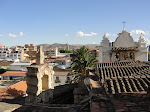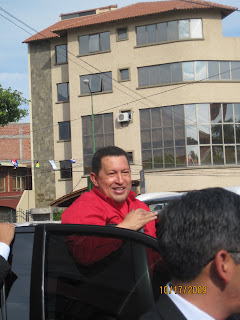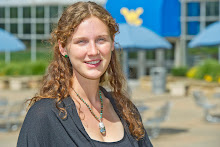Hola!
(Note: I added pics to my last post, so you can take a look)
Well I´ve officially spent a whole entire week in la Bolivia maravillosa, and what a week it´s been. Between an electrified soccer match, shopping in the largest open air market in South America, dancing with some spry old cochabaminas (ladies from Cochabamba), and trying our hand at some homestyle vegetarian cooking, our days have been going by fast, and we´ve barely even begun the real tasks at hand.
I´ll start from the beginning, which would in this case be last Sunday (Saturday wasn´t all that interesting - we went out looking for a contemporary dance performace, got lost, and instead called a taxi and went bowling, haha)
So on to Sunday... As I said Friday, I just met my host mom last weekend, so as sort of a getting-to-know you, we decided to go to La Cancha, which is the largest open air market in South America, and that´s saying something, haha. La Cancha is in the Sou

thern part of the city, which is the poorer area, and covers several city blocks with stands, shops, street vendors, and sort of open warehouses full of every possible item you can imagine. From fresh fruits and vegetables, to artisan crafts, to watches, cell phones, jewelry, pots and pans, TVs, tablecloths, candy, and rows upon winding rows of shoes, jeans, and dresses. There is an interesting mixture of people working the stands - some dressed in the traditional skirts, hats, and colorful wraps of the campesinos (people from the rural ourskirts), and some chatting on cell phones in Levis. We went at lunchtime, so many were eating a plate of rice and meat or other typical dishes, and there were girls inching down the isles selling hot bowls of soup on trays. Ad you walk the smells vary considerably from tastey food to musty clothes to urine, and it´s hard to step anywhere without bumping into someone. This pic is of my host mom talking to one of the vendors about buying peanuts.
We were looking for sandals to replace my recently deceased Havaianas, but didn´t have much luck because a lot of things are closed on Sunday. Still, it was a very fun experience, and was definitely better to go with my host mom, who always seemed to know the way, although to me it seemed an impossible labyrith.
After our semi-successful shopping trip, we ventured out to the country, driving for about 20 minutes. It was

cerainly very interesting to see the abrupt change in landscape from the largely modern Cochaba
mban centro, to the surrounding mountainsides. The houses there are all perched, one on top of the other on the dusty slopes of the mountains surrounding the city, and are largely made of concrete, mud and stone, and many have very shoddy roofing. You could see people washing clothes in the river below, and many made their way in or out of the city along the sides of the road, or up paths and steps that carve their way up the mountains, most dressed in the traditional garb, the origen of which is unknown to me. This photo is of houses we passed on the hillside.
We went, though, to a very lovely restaurant that sits just below the dam, and apparently expanded from being just a little family owned place to a huge restaurant with a salon for weddings, paddle boating and other rides, a multi-storied building and outdoor eating area, and one of the coolest bathrooms I´ve ever seen. It´s still owned and run by the family, though, and in fact the husband was running the boat rental place while the wife was in the kitchen; not your typical enterprise owners.
That evening Jean Carla, our lovely local coordinator, bought us all tickets to the last home game of Wilsterman, one of the two Cochabamban soccer teams. It was, of course, full of crazy screaming soccer fans, some of whom were more so than others, and towards the end the continual chanting and shouts from the crowd got increasi

ngly profane, as neither team had managed to score a single point. About 15 minutes from the end, though, Wilsterman managed to make the winning goal, so it was a good day for Wilsterman fans (and for us as well, as the spirit is highly contagious).
Coming back to crazy fans, there are two sections apart for the craziest hooligans, one of which is the more violent. Apart from the typical smoke bombs, confetti, throwing of plastic bottles, and massive banners, they also felt it was necessary to start catching fires in the stands. This of course led to an active intervention by the numerous

police officers who are there to keep order and protect the opposing team and referees. In fact, they actually showed the police essetially beating a few people up on the screen where the crowd close-ups were being displayed. I didn´t get a good picture, but it was certainly a moment of culture shock. Other than that it was a great time! haha. You can read a far more artfully written version in Eric (our professor´s) blog.
(side note: Since then Wilsterman played a game that secured the team for the running in the national championship, and afterward the opposing coach ran at theirs seemingly in an attempt to attack him, and had to be blocked by the police, so even if it´s culture shock for me, I guess no one besides us was suprised at our game´s events, haha... I hate to think what woud´ve happened had we lost)
After the game we decided to go to Weenta´s (pronounced just like its spelled) for a bit because her family was having an Independence Day party, complete with a live band and gourmet catoring.
Just to elaborate on this before I get into the party: A number of Bolivians have told me that gringos (foreigners) tend to be suprised at the number of parties and parades, etc they have all the time, to which they respond that life is short, and everything should be a cause to celebrate. Monday was the actual Independence Day, and we went out to the city´s main plazas to catch some of the festivities - the parade that was going on lasted for the entire time we were there, which was about 3 hours, and was not showing signs of slowing down. Bands, city officials, mining unions, schools, and just about every one else who had any reason at all to be marching was. This sense of patriotism is interesting to me because it seemed to be largely indigenous people who had come out, but it´s precisely the indigenous people that hardly even reaped the benefit of the struggle for independence. Bolivia is still the poorest country in South America, and these people have been marginalized by their government and the international economy, left with few schools and barely access to clean drinking water. Yet, they still find reason to celebrate their culture and their country. (Like our Spanish teacher told us -
A ustedes les gosta gastar, a nosotros nos gosta bailar!, or "you guys like to spend money, we like to dance")
This is a very interesting time in Bolivia, though, in this regard, because a few years ago Evo Morales, the first "indigenous", rurally born president was elected, and he seems to be a symbol of victory to m

uch of the indigenous community in the way Obama has been to our African American community. Now, I´ve heard very mixed opinions about Evo and his policy, the negatives of which include the fact that he has only a basic education, he seems easily influenced by and in line with socialist leaders such at Chavez and Castro, that he may actually be another
mestizo (mixed Indigenous and European) like former presidents have been, and that many of the ministers that influence him are corrupt, whether he is or not. This December he´ll be up for reelection, so we should get to wittness some pretty exciting political action by both the government and the people. As is it now the city´s Plaza Central, or the plaza 14 de Septiembre (which is where my pic was taken) is littered with largely liberal political propaganda that gives you an interesting perspective from the view of Bolivian activists. This photo is of a few indigenous ladies hanging out in the Central Plaza in Independence Day.
In other news, there was a protest this week where the transportation union had blocked off many of the streets in central Cochabamba, demanding the government talk to them about transportation reform (including the street our afternoon class was on, haha). Apparently the transportation unions are very strong, and don´t like the fact there there are numerous unregistered vehicles that they have to compete with. Blockades are pretty common in the city and the country, and my host family just said they don´t make much of a difference. The government just says they´ll talk to union leaders to they´ll upen everything back up, but then nothing really gets accomplished anyway.
Of course, Bolivian and Latin American politics will be one thing we´ll be exploring in much greater depth as the semester progresses, so this has been an extremely superficial analysis. I just wanted to give you a little idea of what´s going on down here.
So back to the party, which was, as I said, complete with a band, good food, and pretty much exclusively older relatives. In fact, I have a lovely picture of me giving cow tongue a try, which is apparently very popular in Cochabamba, Bolivia´s most famous gastronomic center. I don´t think it would´ve been that bad had I not been able to see the taste buds - something about that just grossed me out way too much to even begin to enjoy it, haha.

Other than that, though, the party was great. We ended up being pulled onto the dance floor by Weenta´s host mom, and a few other ladies, where we did some traditional-ish dance for like a half an hour. We were definitely getting into it, and by the end everyone was sweaty and tired from laughing. Margaret, in particular, connected really well with one of the ladies, and they were really breaking it down, haha. That´s what this pic is of. We also got to see Weenta´s host dad and host sister do a beautiful traditional couples dance with handkerchiefs.
So those are probably the most interesting things that I´ve done lately. This week we began both Spanish and our Poli Sci and history classes. Toni, our Spanish teacher, is great. She makes classes go by very quickly because we have a good time, and she even threw Hannah a party yesterday because today is her 20th b-day. The other classes look like they´re going to be really interesting as well. This week was just sort of intro, but I think we´re going to learn sooo much more here than we would´ve at home. Learning about the often vague concepts of development, poverty, class struggle, etc is given a whole new light when you actually get to see people living it out. We don´t start our service until next week, and have thus far only had a very small taste in the city, but I think in the weeks to come this trip will really start to come alive.
A short term group is coming to do some manual labor on a school, which we´ll be partaking in this Monday and two days the following week. We´re going to stay with host families out in the country for that and actually do some real work, so it should make for a great experience and an interesting entry. We also start our service next week, so look for a new post on that stuff next weekend-ish.
Also, I´d appreciate if you can send some positive thoughts and prayers to my Papa and Nana Jane, who were both in the hospital last week. They´re home now, but still need all the support they can get. Thanks!
That´s all for now, I´m about ready for some home-cooked lunch! I hope there weren´t too many errors - I´m feeling way too lazy to proof-read, haha.
All the Best,
Alanna
Since I forgot to add a song last time, I´m putting up two this time.
Maná - Manda una Señal (a very famous song by a very famous Mexican band)
Chimarruts - Saber Voar (by a Brazilian reggae band, one of my all time favorite love songs)
P.S. Sorry about the funky formatting. It always looks nomal in the editing window, but weird on the page. I don´t think I can do much about it. Also, pics aren´t up yet. I might do a shutterfly instead because Flickr only allows 100/month, but I need to do homework this afternoon, so if I do set that up tomorrow will be the earliest. Sorry!
 weekend when we traveled to Potosí, an old mining town that, in its prime, was larger than London and was almost singularly responsible for Spain's great wealth in silver and other minerals at the height of it's imperial power. Potosí, which lies many hours south of Cochabamba by bus, is home to the Cerro Rico, a volcanic mountain (although not a volcano; the volcanic movements are what pushed all the minerals so close to the surface of the earth) that has huge deposits of silver, tin, and 96 other natural minerals. The inside of the mine at times sparkles with pyrite and quartz, while colored stalactites and stalagmites drip from the cielings and grow from the floors. There is a thick mineral dust that constantly fills the air, and levels upon levels of mining shafts connected by narrow, roughly carved tunnels that burrow vertically to the roots of the mountain (and, consequentally, scare the daylights out of claustrophobic tourists such as myself).
weekend when we traveled to Potosí, an old mining town that, in its prime, was larger than London and was almost singularly responsible for Spain's great wealth in silver and other minerals at the height of it's imperial power. Potosí, which lies many hours south of Cochabamba by bus, is home to the Cerro Rico, a volcanic mountain (although not a volcano; the volcanic movements are what pushed all the minerals so close to the surface of the earth) that has huge deposits of silver, tin, and 96 other natural minerals. The inside of the mine at times sparkles with pyrite and quartz, while colored stalactites and stalagmites drip from the cielings and grow from the floors. There is a thick mineral dust that constantly fills the air, and levels upon levels of mining shafts connected by narrow, roughly carved tunnels that burrow vertically to the roots of the mountain (and, consequentally, scare the daylights out of claustrophobic tourists such as myself). We entered into a shaft that was opened during the time of Spanish rule, and followed it along with our guides and fellow foreigners (Europeans and Canadians) until we had to make the descent to the lower shafts. Each shaft was usually just a little too short for me to stand up straight, although there were larger caverns from time to time. To get into the lower shafts you shimmy/scoot/climb your way down narrow little tunnels that curve downward and sidways so you can't see anyone else most of the time. At times they were small enough that you had to literally crawl, and at those times I was practicing some serious mental self-calming and deep breaths, haha.
We entered into a shaft that was opened during the time of Spanish rule, and followed it along with our guides and fellow foreigners (Europeans and Canadians) until we had to make the descent to the lower shafts. Each shaft was usually just a little too short for me to stand up straight, although there were larger caverns from time to time. To get into the lower shafts you shimmy/scoot/climb your way down narrow little tunnels that curve downward and sidways so you can't see anyone else most of the time. At times they were small enough that you had to literally crawl, and at those times I was practicing some serious mental self-calming and deep breaths, haha.

















 A local walks his horse down the mountain; Descending the path to the waterfall
A local walks his horse down the mountain; Descending the path to the waterfall












